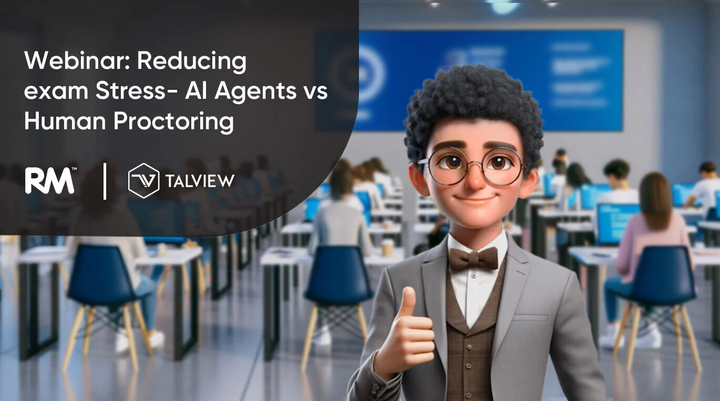With the growing need for more secure and accessible online exams, the debate between AI-powered proctoring agents and human proctoring becomes increasingly important. Can AI agents help reduce stress while maintaining exam integrity? Or does the presence of a human proctor still offer the best approach to ensure fairness?
In the recent webinar, Reducing Exam Stress: Human Proctoring vs AI Agents, industry leaders Sanjoe Jose, CEO and Co-Founder of Talview and Anna Hinchliffe, Senior Propositions Manager at RM, explored how advancements in proctoring technology are transforming the candidate experience. To watch the full webinar, you can click on this link.
The Evolution of Proctoring: From Classroom to AI Agents
The journey of exam proctoring has seen several phases:
- Traditional Classroom Proctoring: The traditional approach, with human oversight during exams.
- Remote Human Proctoring: Virtual monitoring, often using video conferencing tools like Zoom.
- Recorded Proctoring: Post-session review of recorded exam sessions.
- Automated Proctoring: Technology-driven systems that detect suspicious behavior during the exam in real time.
- AI Proctoring Agents: The latest innovation combining human-like intelligence with automated proctoring.
What Makes Online Exams Stressful for Candidates?
Remote testing offers convenience and flexibility, but it also introduces unique challenges for test-takers. Many individuals face stress due to unfamiliarity with online exam formats and technical uncertainties that heighten their anxiety. Communication barriers with proctors from diverse cultural backgrounds further complicate the experience. Privacy concerns arise from the use of webcams for monitoring, and automated systems often trigger false flags, adding to the stress. Additionally, the fear that technical glitches might affect their exam results makes remote testing a daunting process for many.
How Are AI Agents Revolutionizing Proctoring?
Alvy, the world's first AI proctoring agent represents the next generation of proctoring by blending human insight with advanced AI capabilities.
- Real-Time Monitoring with Context: Evaluates behaviors within context, reducing false positives like flagging natural actions (e.g., looking away while thinking).
- 24/7 Availability: Operates around the clock, providing continuous monitoring and support for assessments, regardless of time zones.
- Interactive Support: Communicate directly with test-takers, addressing queries in real time and adapting its approach to ensure fairness.
- Enhanced Accuracy: Identifies 8 times more violations with 98% accuracy compared to traditional methods, significantly reducing false positives.
- Accessibility and Inclusivity: Configurable settings accommodate diverse needs, including extra time or specialized assistance.
Conclusion
The webinar offered valuable insights into the transformative role of AI proctoring agents in the remote testing landscape. It highlighted how innovative solutions address key challenges, reduce stress for test-takers, and enhance the integrity of the exam process, ultimately paving the way for a more efficient, inclusive, and reliable assessment experience. As more institutions adopt AI proctoring solutions, there’s great promise for the future of exams—where technology can help create a fairer, less stressful environment for all candidates.








Leave a Reply